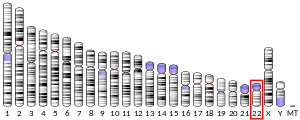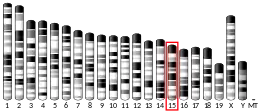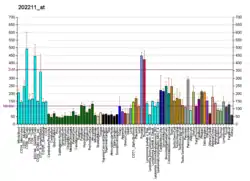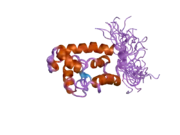| ARFGAP3 | |||||||||||||||||||||||||||||||||||||||||||||||||||
|---|---|---|---|---|---|---|---|---|---|---|---|---|---|---|---|---|---|---|---|---|---|---|---|---|---|---|---|---|---|---|---|---|---|---|---|---|---|---|---|---|---|---|---|---|---|---|---|---|---|---|---|
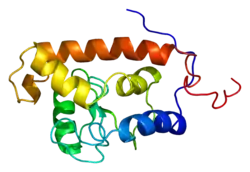 | |||||||||||||||||||||||||||||||||||||||||||||||||||
| |||||||||||||||||||||||||||||||||||||||||||||||||||
| Identifiers | |||||||||||||||||||||||||||||||||||||||||||||||||||
| Aliases | ARFGAP3, ARFGAP1, ADP ribosylation factor GTPase activating protein 3 | ||||||||||||||||||||||||||||||||||||||||||||||||||
| External IDs | OMIM: 612439 MGI: 1913501 HomoloGene: 134103 GeneCards: ARFGAP3 | ||||||||||||||||||||||||||||||||||||||||||||||||||
| |||||||||||||||||||||||||||||||||||||||||||||||||||
| |||||||||||||||||||||||||||||||||||||||||||||||||||
| |||||||||||||||||||||||||||||||||||||||||||||||||||
| |||||||||||||||||||||||||||||||||||||||||||||||||||
| Wikidata | |||||||||||||||||||||||||||||||||||||||||||||||||||
| |||||||||||||||||||||||||||||||||||||||||||||||||||
ADP-ribosylation factor GTPase-activating protein 3 is a protein that in humans is encoded by the ARFGAP3 gene.[5][6][7]
The protein encoded by this gene is a GTPase-activating protein (GAP) which associates with the Golgi apparatus and which is thought to interact with ADP-ribosylation factor 1 (ARF1). The encoded protein likely promotes hydrolysis of ARF1-bound GTP, which is required for the dissociation of coat proteins from Golgi-derived membranes and vesicles. Dissociation of the coat proteins is a prerequisite for the fusion of these vesicles with target compartments. The activity of this protein is sensitive to phospholipids. This gene was originally known as ARFGAP1, but that is now the name of a related but different gene.[7]
References
- 1 2 3 GRCh38: Ensembl release 89: ENSG00000242247 - Ensembl, May 2017
- 1 2 3 GRCm38: Ensembl release 89: ENSMUSG00000054277 - Ensembl, May 2017
- ↑ "Human PubMed Reference:". National Center for Biotechnology Information, U.S. National Library of Medicine.
- ↑ "Mouse PubMed Reference:". National Center for Biotechnology Information, U.S. National Library of Medicine.
- ↑ Zhang C, Yu Y, Zhang S, Liu M, Xing G, Wei H, Bi J, Liu X, Zhou G, Dong C, Hu Z, Zhang Y, Luo L, Wu C, Zhao S, He F (Jul 2000). "Characterization, chromosomal assignment, and tissue expression of a novel human gene belonging to the ARF GAP family". Genomics. 63 (3): 400–8. doi:10.1006/geno.1999.6095. PMID 10704287.
- ↑ Liu X, Zhang C, Xing G, Chen Q, He F (Feb 2001). "Functional characterization of novel human ARFGAP3". FEBS Lett. 490 (1–2): 79–83. doi:10.1016/S0014-5793(01)02134-2. PMID 11172815. S2CID 34808599.
- 1 2 "Entrez Gene: ARFGAP3 ADP-ribosylation factor GTPase activating protein 3".
External links
- Human ARFGAP1 genome location and ARFGAP1 gene details page in the UCSC Genome Browser.
- Human ARFGAP3 genome location and ARFGAP3 gene details page in the UCSC Genome Browser.
Further reading
- Matoba R, Okubo K, Hori N, et al. (1994). "The addition of 5'-coding information to a 3'-directed cDNA library improves analysis of gene expression". Gene. 146 (2): 199–207. doi:10.1016/0378-1119(94)90293-3. PMID 8076819.
- Dunham I, Shimizu N, Roe BA, et al. (1999). "The DNA sequence of human chromosome 22". Nature. 402 (6761): 489–95. Bibcode:1999Natur.402..489D. doi:10.1038/990031. PMID 10591208.
- Strausberg RL, Feingold EA, Grouse LH, et al. (2003). "Generation and initial analysis of more than 15,000 full-length human and mouse cDNA sequences". Proc. Natl. Acad. Sci. U.S.A. 99 (26): 16899–903. Bibcode:2002PNAS...9916899M. doi:10.1073/pnas.242603899. PMC 139241. PMID 12477932.
- Collins JE, Goward ME, Cole CG, et al. (2003). "Reevaluating human gene annotation: a second-generation analysis of chromosome 22". Genome Res. 13 (1): 27–36. doi:10.1101/gr.695703. PMC 430954. PMID 12529303.
- Ota T, Suzuki Y, Nishikawa T, et al. (2004). "Complete sequencing and characterization of 21,243 full-length human cDNAs". Nat. Genet. 36 (1): 40–5. doi:10.1038/ng1285. PMID 14702039.
- Collins JE, Wright CL, Edwards CA, et al. (2005). "A genome annotation-driven approach to cloning the human ORFeome". Genome Biol. 5 (10): R84. doi:10.1186/gb-2004-5-10-r84. PMC 545604. PMID 15461802.
- Gerhard DS, Wagner L, Feingold EA, et al. (2004). "The status, quality, and expansion of the NIH full-length cDNA project: the Mammalian Gene Collection (MGC)". Genome Res. 14 (10B): 2121–7. doi:10.1101/gr.2596504. PMC 528928. PMID 15489334.
- Barrios-Rodiles M, Brown KR, Ozdamar B, et al. (2005). "High-throughput mapping of a dynamic signaling network in mammalian cells". Science. 307 (5715): 1621–5. Bibcode:2005Sci...307.1621B. doi:10.1126/science.1105776. PMID 15761153. S2CID 39457788.
- Olsen JV, Blagoev B, Gnad F, et al. (2006). "Global, in vivo, and site-specific phosphorylation dynamics in signaling networks". Cell. 127 (3): 635–48. doi:10.1016/j.cell.2006.09.026. PMID 17081983.
This article is issued from Wikipedia. The text is licensed under Creative Commons - Attribution - Sharealike. Additional terms may apply for the media files.
